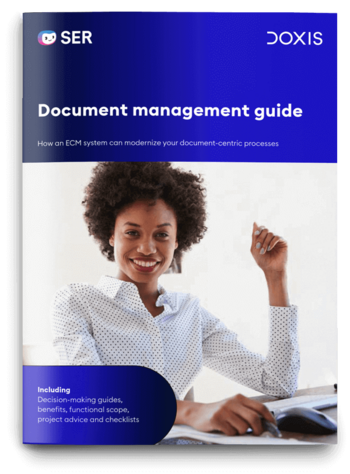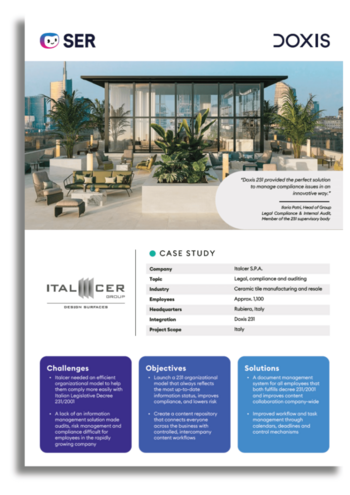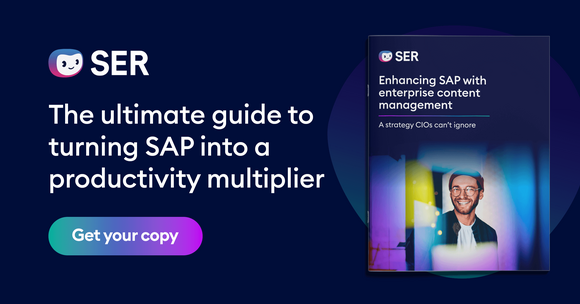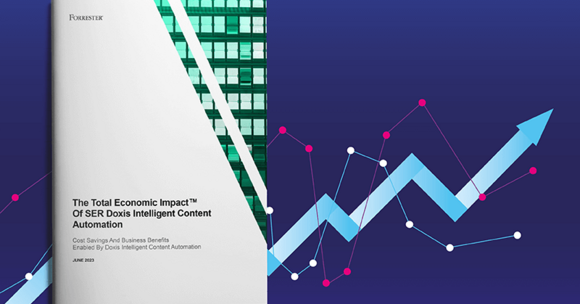SER Blog Information Governance
NDMO compliance: What you need to succeed
Andrea Taboada
Having actively partnered with companies in Saudi Arabia, we understand the hurdles of constantly staying compliant in the face of ever-evolving regulations, industry standards, and emerging technologies. But compliance goes beyond box-ticking; it’s the cornerstone of safeguarding your organization’s integrity and preventing unnecessary costs down the road.
With the National Data Management Office (NDMO) now in effect in Saudi Arabia, it’s crucial to understand what this means for your organization and how it could impact your operations. So, let’s jump in and see how the NDMO will change the way you work.

What is the NDMO?
The National Data Management Office (NDMO) in Saudi Arabia is the country’s data regulator, responsible for overseeing data management and governance initiatives nationwide.
Why was the NDMO established?
The NDMO was established to address challenges in data structuring, preparation, and governance. It introduces data management and personal data protection standards with several key objectives:
-
Enhancing data integrity: Ensuring accurate and consistent data across systems.
-
Securing personal information: Protecting sensitive personal information from unauthorized access and breaches.
-
Ensuring compliance: Meeting regulatory requirements to safeguard data practices.
The NDMO framework:
The NDMO framework is designed to cover the entire data lifecycle and includes 15 distinct domains, each with specific controls and practices tailored to enhance data management processes.
Organizations that comply with the NDMO framework can achieve:
-
Improved decision-making: By leveraging reliable and timely data.
-
Enhanced data reliability: Ensuring that the data used for decision-making is accurate and dependable.
-
Mitigated risks: Reducing vulnerabilities associated with data management and ensuring data integrity.
Key entities in Saudi Arabia urged to adopt NDMO standards
NDMO is important for various companies, particularly those operating in Saudi Arabia. It's especially crucial for government agencies, public organizations, and businesses dealing with sensitive data, as NDMO sets standards and regulations for effective data management and personal data protection.
Source: Data Standards Document (sdaia.gov.sa)

How can a DMS boost your organization’s efficiency? Which system is right for you? This practical guide helps you to find & implement the right DMS. Incl. checklists, real-life examples, etc. Read now ⯈
How the National Data Management Office (NDMO) in Saudi Arabia will impact your company
Here's what you need to know:
- Standardization:
The NDMO is introducing uniform data management practices to ensure consistency across the board. - Accountability:
Clear roles and responsibilities are being assigned for data governance, enhancing accountability within organizations. - Security:
There's a strong emphasis on implementing robust measures to protect data, ensuring heightened security against cyber threats. - Data quality:
The focus is on enhancing the accuracy and reliability of data, which is crucial for making informed business decisions. - Transparency:
The NDMO encourages transparent documentation of data management processes, fostering clarity and trust. - Adoption of standards:
By promoting alignment with international best practices, the NDMO ensures that companies stay updated and competitive in the global market.
The consequences of ignoring
NDMO Ignoring NDMO regulations can result in severe penalties, exposing you to fines, legal sanctions, reputational damage, loss of trust from customers and stakeholders, and potential disruption to operations. There’s also the very real risk of missed business opportunities, data breaches and cyber threats. This makes it tougher to secure partnerships or contracts with government bodies and organizations that highly value data security and compliance.
Criminal penalties
- Unlawful disclosure or publishing of sensitive data:
If sensitive data is disclosed or published unlawfully with the intent to harm the data owner or for personal gain, penalties include imprisonment of up to two years and/or a fine of up to 3 million Saudi Riyals (approximately USD 800,000).
- Unlawful transfer of personal data outside the Kingdom:
If personal data is transferred outside of Saudi Arabia without proper justification, such as not serving the interests of the Kingdom or not being part of an international agreement Saudi Arabia is involved in, the penalties can include imprisonment of up to one year and/or a fine of up to 1 million Saudi Riyals (approximately USD 266,666).
- Administrative fines
The competent authority may impose fines of up to 5 million Saudi Riyals (approximately USD 1,333,333) for violations of the PDPL. - Court confiscation orders
Courts have the authority to confiscate funds obtained as a result of violating the PDPL. - Compensation
Individuals may seek compensation for damages incurred as a result of violations of the PDPL and its regulations.
Sources:
Data Standards Document (sdaia.gov.sa)
Microsoft Word - Personal Data English V2-23April2023- Reviewed-.docx (sdaia.gov.sa)

Doxis can prevent penalties and add value to your organization
Let’s face it: Manual compliance processes are time-consuming, error-prone, and inefficient. That’s where automation comes in.
Doxis is a document and quality management software solution that supports organizations in achieving regulatory compliance. It centralizes document storage, ensures version control, provides document traceability, automates workflows, and helps manage risks. This supports compliance with NDMO standards by ensuring efficient document management and adherence to regulatory requirements.
Why Doxis is critical for compliance
-
Mitigates compliance risks
Doxis' innovative document management capabilities significantly reduce the risk of non-compliance with NDMO standards, thereby minimizing potential penalties and legal issues. It ensures consistent adherence to regulations, enhancing your organization's reliability and trustworthiness with regulatory bodies, and decreasing the likelihood of audits and investigations.
-
Improves data quality
Doxis automatically cleanses, standardizes, and validates data, ensuring high-quality information is available for decision-making, reducing errors, and avoiding costly mistakes. With enhanced data management, you get more accurate, reliable, and consistent data, which builds stakeholder trust.
-
Increases efficiency
Doxis automates routine compliance tasks, allowing staff to concentrate on strategic initiatives that drive business growth. This automation of tasks like data entry and reporting frees up employee time for higher-value activities, speeding up compliance processes and boosting overall productivity.
-
Optimizes operations
Doxis’ automated workflows facilitate quicker decision-making and smoother operational processes, increasing efficiency and productivity. It integrates seamlessly with existing systems to streamline workflows, eliminate bottlenecks, and enhance inter-departmental collaboration.
-
Maximizes data value
Doxis helps organizations extract more value from their data, enabling better business insights and outcomes, improved data quality and value, and greater operational efficiency. Accurate and accessible data supports informed decision-making, fostering innovation and competitiveness.
-
Reduces costs
Automation reduces the need for manual labor, cutting administrative costs and freeing resources for strategic investments. This reduction in manual tasks like data verification lowers costs significantly, improving the bottom line and enabling investment in growth and innovation.
-
Facilitates scalability
Doxis’ automated processes can scale with your business, ensuring compliance efforts are effective and sustainable through business growth or increasing regulatory demands. This scalability maintains compliance efficiency and reliability, regardless of business size or complexity.

Italcer S.P.A: See how they simplified compliance with Doxis
Find out how business manufacturing & supplier Italcer S.P.A was able to navigate compliance with Doxis, gaining powerful audit, risk and compliance management-as-a-service.
Read case study nowPutting Doxis into action: A practical overview
Implementing Doxis can revolutionize your organization’s compliance efforts. Here’s how it works in practice:
Workflow automation
-
Automated approval processes:
Workflow automation tools simplify document approvals by routing them to stakeholders sequentially or in parallel, ensuring compliance with review requirements. With Doxis, approval processes become streamlined and transparent, reducing delays and ensuring timely decision-making.
-
Audit trails:
Automation systems track document actions, providing transparency and accountability for compliance with regulations. Doxis generates detailed audit trails, allowing organizations to trace every action taken on a document, from creation to approval, ensuring regulatory compliance and facilitating audits.
-
Compliance checks:
Automated workflows verify documents meet regulatory standards before approval, preventing non-compliance penalties. Doxis incorporates compliance checks into approval workflows, automatically flagging documents that don't meet regulatory requirements, thus reducing the risk of penalties and fines.
Correspondence management systems
-
Centralized repository:
Correspondence management systems store all incoming and outgoing correspondence in one place, ensuring consistent recordkeeping for compliance. Doxis provides a centralized repository for all correspondence, making it easy to access and manage communication records, ensuring compliance with recordkeeping regulations. -
Automated classification and routing:
These systems automatically categorize and direct correspondence to the right recipients, ensuring timely handling and compliance with response time rules. -
Security and access controls:
Correspondence management systems provide strong security measures like encryption and access controls to protect sensitive correspondence, ensuring compliance with data privacy regulations.
Other compliance solutions
-
Records management solutions:
These solutions oversee records from creation to disposal, ensuring compliance with retention requirements. Doxis offers comprehensive records management capabilities, ensuring that records are properly managed throughout their lifecycle, from creation to disposal, in compliance with retention regulations.
-
Compliance monitoring tools:
These tools track activities and data to spot compliance issues, triggering alerts for swift corrective action. Doxis includes compliance monitoring tools that continuously monitor document activities and data, identifying compliance issues in real-time and triggering alerts for prompt corrective action, minimizing the risk of non-compliance.
-
Policy management platforms:
These platforms distribute and enforce compliance policies, ensuring employees understand and adhere to their obligations. Doxis integrates with policy management platforms, enabling organizations to distribute and enforce compliance policies effectively, ensuring that employees understand and comply with their obligations, thus reducing the risk of compliance violations.
Leave your compliance worries behind: Let Doxis do what it does best
For companies operating in Saudi Arabia, adopting NDMO standards is essential to staying competitive and building trust with stakeholders. Failure to comply with NDMO regulations can lead to severe consequences, including fines, reputational damage, and operational disruptions.
However, with the right tools and solutions in place, such as Doxis, organizations can streamline their compliance efforts, minimize risks, and add value to their operations. Doxis automates key compliance processes, improves data quality, enhances efficiency, and ensures scalability—all while reducing costs and facilitating better decision-making.
Still need help? Get in touch with our experts. We can show you how to navigate not only navigate NDMO, but any legal barriers holding you back.
The latest digitization trends, laws and guidelines, and helpful tips straight to your inbox: Subscribe to our newsletter.
How can we help you?
+49 (0) 30 498582-0Your message has reached us!
We appreciate your interest and will get back to you shortly.




